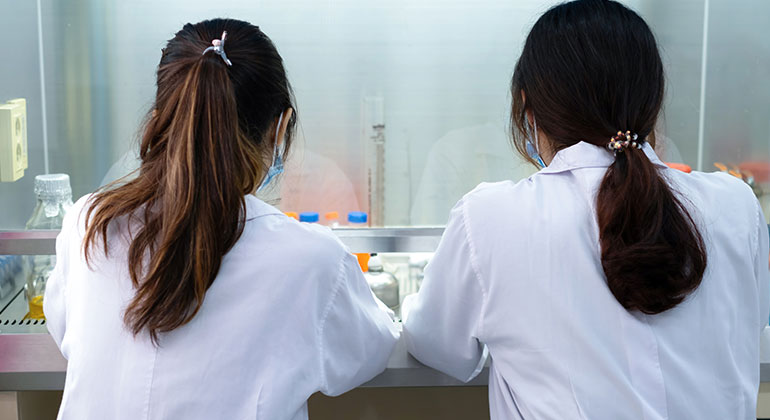First Study to Directly Compare Gene Mutation Type in Individuals With CHAMP1 Disorder Indicates Key Differences
Understanding the causes of this neurodevelopmental disorder is important to the development of new precision medicine therapies

New research led by the Seaver Autism Center for Research and Treatment at Mount Sinai has illuminated genetic differences among children with a rare neurodevelopmental condition and could point the way toward a precision medicine approach to caring for these children.
The study is the first of its kind to directly assess differences between individuals with mutations in the CHAMP1 gene and those with deletions of the gene. The analysis was published in Human Genetics on July 17.
CHAMP1 disorder is a genetic, neurodevelopmental condition associated with intellectual disability, medical comorbidities (e.g., seizures, gastrointestinal problems), and dysmorphic features. The disorder is caused by mutations or deletions of the CHAMP1 gene.
Researchers from the Seaver Autism Center performed clinical evaluations of two groups of subjects: 16 individuals with CHAMP1 coding mutations (spelling changes in the gene), and eight individuals with deletions of CHAMP1.
The group with CHAMP1 gene mutations revealed significantly lower adaptive functioning skills than those with deletions across all areas assessed, including communication, daily living skills, socialization, and motor skills. Those in the mutation group also had more severe developmental delays and were more likely to have low muscle tone and gastrointestinal abnormalities.
Researchers hypothesize that the variation in symptoms is likely attributable to differences in the mechanisms behind the deletions and mutations of the CHAMP1 gene. Deletions act through CHAMP1 haploinsufficiency, which occurs when the remaining functioning copy of the CHAMP1 gene is not adequate to preserve normal function alone. Mutations may be acting through dominant negative or gain-of-function mechanisms, which actively interfere with the normal gene function and lead to more severe clinical symptoms.
“Hearing parents describe the challenges and strengths their children experience and possess has showed us that while these children share the diagnosis of CHAMP1 disorder, their presentations and behaviors often differ,” said Thariana Pichardo, Clinical Research Coordinator at the Seaver Autism Center, who completed many of the study’s key clinical assessments.
The study results illustrate the importance of understanding the mechanisms of mutations and deletions prior to treatment development for CHAMP1 and other disorders, like autism, that have broad diagnosis with differing genetic causes.
“This analysis unveils valuable insight into potential therapeutics that may lead to successful symptom improvement,” said Tess Levy, CGC, Assistant Professor of Psychiatry at the Icahn School of Medicine at Mount Sinai and first author of the paper. “Pinpointing the mechanisms that are the source of this disorder will enable a precision medicine approach to treatment for the two groups of patients with different presentation but ultimately the same CHAMP1 disorder diagnosis.”
About the Seaver Autism Center for Research and Treatment
The Seaver Autism Center is one of the most recognized institutions of its kind in the world because of its ability to translate breakthroughs in the lab to clinical trials that bring cutting-edge treatment to individuals affected by autism spectrum disorder (ASD) and associated neurodevelopmental disorders. We offer compassionate care, including assessment and behavioral health services, to children and families, as well as educational and community outreach programs. Founded in 1993 and located at the Icahn School of Medicine at Mount Sinai, families come from around the world to seek our services and the expert counsel of our team of scientists, researchers and clinicians.
For more information, visit: www.seaverautismcenter.org, or find the Seaver Autism Center on Facebook, Twitter and Instagram.
About the Mount Sinai Health System
Mount Sinai Health System is one of the largest academic medical systems in the New York metro area, with 48,000 employees working across seven hospitals, more than 400 outpatient practices, more than 600 research and clinical labs, a school of nursing, and a leading school of medicine and graduate education. Mount Sinai advances health for all people, everywhere, by taking on the most complex health care challenges of our time—discovering and applying new scientific learning and knowledge; developing safer, more effective treatments; educating the next generation of medical leaders and innovators; and supporting local communities by delivering high-quality care to all who need it.
Through the integration of its hospitals, labs, and schools, Mount Sinai offers comprehensive health care solutions from birth through geriatrics, leveraging innovative approaches such as artificial intelligence and informatics while keeping patients’ medical and emotional needs at the center of all treatment. The Health System includes approximately 9,000 primary and specialty care physicians and 10 free-standing joint-venture centers throughout the five boroughs of New York City, Westchester, Long Island, and Florida. Hospitals within the System are consistently ranked by Newsweek’s® “The World’s Best Smart Hospitals, Best in State Hospitals, World Best Hospitals and Best Specialty Hospitals” and by U.S. News & World Report's® “Best Hospitals” and “Best Children’s Hospitals.” The Mount Sinai Hospital is on the U.S. News & World Report® “Best Hospitals” Honor Roll for 2025-2026.
For more information, visit https://www.mountsinai.org or find Mount Sinai on Facebook, Instagram, LinkedIn, X, and YouTube.